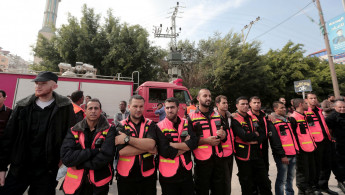Salary protests portend fresh disruption for battered Gaza
For over six months, many of Gaza’s public sector workers have gone completely unpaid, due to a financial crunch combining with an ongoing political division and compounded by a tight siege on the strip imposed by both Israel and Egypt.
| If the concerned parties agree ... this problem can be solved overnight. - Sami al-Amasy, union leader |
And at the end of January it was finally too much for Gaza’s medical professionals who began their first ever regular protests. Such protests has not sprung up before in spite of the enormous stress on that sector that life in Gaza has meant over the past nearly eight years of a tightly-imposed Israeli siege, rendering the provision of supplies precarious, and through three devastating weeks-long Israeli military assaults.
For staff nurse Abdullah al-Hourani, 47, everything has been affected.
“I had to suspend paying tuition fees for my two sons in university. Can you imagine, I had to sell my family computer to pay bills,” said the father of eight.
The breaking point, however, came when, unable to afford a taxi, his wife suffered a miscarriage last year before she could get to hospital.
Hourani, from Rafah, has been participating in the weekly protests to shed light on the plight of medical professionals in Gaza. For now, the action by doctors and nurses are confined to weekly protests rather than the kind of strikes Gaza witnessed when hospital cleaners went on strike in December, also because of unpaid wages.
But the consensus here is that the political rivalry between Hamas, which rules the Gaza Strip, and Fatah in the West Bank – a rivalry that has persisted in spite of a unity government agreed back in June – is putting people’s lives at risk.
“We thought that the unity government meant that payments would start flowing,” said Dr Abdel Latif al-Haj, director of emergency departments at Gaza’s government-run hospitals. “Unfortunately, this has not happened. I expect that shortly, we will see medical staff go on strike.”
A crisis of politics
In Gaza, fingers are mostly pointing at Ramallah and the Palestinian Authority (PA). Hani al-Basous, a Gaza-based political analyst, said that consensus government needed to make public sector issues in Gaza, specifically the health and education sectors, a priority.
"Even if the PA has been undergoing some notable financial problems, the health sector should not be abandoned. I think the PA should spend funds on the health sector by relying on other internal resources, and not necessarily on outside resources."
The PA has seen its revenues dwindle after Israel decided to withhold the tax monies it collects on behalf of the Palestinian authority in the West Bank on goods entering the country. That revenue makes up about two-thirds of the PA’s budget.
The Israeli move came in retaliation for the PA applying to join the International Criminal Court (ICC) at the turn of the year.
That application was made in an apparent effort to hold Israel accountable for crimes committed in Gaza during Israel’s last assault on the strip in the summer of 2014, when some 2,200 Palestinians were killed and 100,000 people were left homeless over 51 days between July and August.
According to the International Monetary Fund, in addition to the enormous human and material toll of that attack, the Israeli onslaught also saw Gaza’s economy contract by an estimated 15 percent last year.
In that context, the non-payment of public sector wages is an explosive issue, not least because, in spite of the advent of the unity government, it is the salaries of Hamas-hired employees – since that split in 2007 – that mostly go unpaid.
Hamas had paid the salaries of some 42,000 people since 2007. But it remained an unsolved issue in the unity negotiations that led what is also called the consensus government. And once that government was sworn in in June, payments to those employees dried up.
Since then, war and want has dominated the headlines. And in spite of multi-billion dollar donor pledges in October, little has materialized and Rami Hamdallah, the consensus prime minster, is on yet another tour, hat in hand, to drum up support from donors.
The only respite Hourani has had in recent months was when a Qatari grant came through in October resulting in a one-off US$1,200 payment to medica professionals. Apart from that, nothing.
| Read more: The parlous passage to Gaza |
Mahmoud Abbas, the PA president, came under intense criticism for flying off to Paris to take part in the Charlie Hebdo march in January, rather than attend to more pressing matters at home.
And the perception here is that, in spite of the financial difficulties, it is the political will that is missing in Ramallah to prioritize paying salaries, another attempt by Fatah to hurt Hamas.
“If the concerned parties agree that the national interest is the priority, then this problem can be solved overnight,” said Sami al-Amasy, head of the Palestinian General Federation of Trade Unions in Gaza, told al-Araby al-Jadeed.
If Abbas wanted, Amasy said, he could ensure that salaries were paid “immediately”.
“This issue is a purely political one.”


![President Pezeshkian has denounced Israel's attacks on Lebanon [Getty]](/sites/default/files/styles/image_684x385/public/2173482924.jpeg?h=a5f2f23a&itok=q3evVtko)



 Follow the Middle East's top stories in English at The New Arab on Google News
Follow the Middle East's top stories in English at The New Arab on Google News


